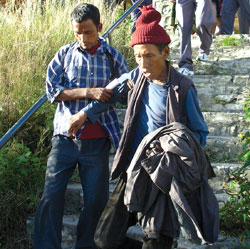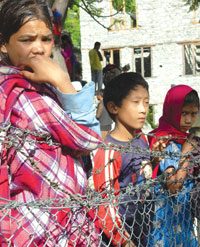|
|
| LET DOWN: Children (above) joined their parents from far off villages to attend the briefing by security officials about the voting process in Kolti on Saturday. |
When news came this week that the politicians in faraway Kathmandu had failed to agree on preconditions to polls, there was deep disappointment and anger here in the Bajura airport of Kolti. "These politicians are just destroying our country by playing their little games," fumes Nanda Prasad Joshi, a farmer in Jagannath VDC, "we could have used the money they set aside for elections to build roads here."
Most Bajura villages don't have roads, electricity, telephones, hospitals and food, but the elections were seen as important. Local teachers employed for election work had even overcome Maoist opposition to complete preparations. Now, the enthusiasm has been replaced by despair and fear of a return to war.
"We really felt that the elections would help take this country back to peace," says 18-year-old student, Puspa Raj Debkota, who would have voted for the first time.
There is plenty here that reminds people of the dark days of war. Twenty-three villagers were lined up and shot by the army near Kolti airfield five years ago, 13 of them were innocent civilians. None of the families ever got any compensation.
"This election would have made a lot of difference to us," says Ganey Motara from Chhapu village. Farmers here may not know the technical aspect of the elections and the ballot paper, but even the most illiterate ones knew that it was about drafting a new constitution that would bring peace and roads.
"I knew why I had to vote, it was so my children would have a better life," says Motara.
 |
| STILL AT WAR: A severely sick farmer (above) had walked nearly 20 hours to reach the Bajura airport where he was escorted after days of waiting only to be as rejected due to the overbooked flight |
Bajura was the worst-hit by drought among the ten districts of the far west in the past two years. The food situation was so bad that the World Food Programme (WFP) launched its first ever emergency operation to feed 225,000 people here in 2006. If there was a road, the shortage wouldn't have been as severe.
The WFP has helped with the Martadi road through its Food for Work program that is supported by the German, Danish and Dutch governments. But only 41km of the 65km road is complete, and even the existing stretches are blocked by landslides. The people here blame the government, the government blames the conflict and the fact that food meant for construction was looted by Maoists.
"We need an MP who will do something for us by finishing the road, we don't care which party he belongs to," says Debu Rawal, who brought his one-year old daughter to a health camp from four hours away. His daughter looks barely three months old due to malnutrition.
Most children under five here don't get enough to eat, they are stunted and many die because chronic hunger makes them more vulnerable to infections. This is not famine on an African scale, but it is slow hunger that kills just as surely.
"For us a new Nepal means a Nepal where children don't got to bed hungry every night, one where there are medicines available," says Sheela Nepali who walked for a whole day from Ghotri village to get a medical checkup.
Most of the cases treated at the health camps were related to poor nutrition. It's a catch-22: people can only work on road construction if they have enough to eat, but they can only eat if they can earn food from work.
Even Kolti, considered better than other Bajura villages, doesn't even have a hospital or a proper clinic. A three-bed hospital is under construction. There is no electricity, telephone line or road. Only 45 percent of villagers can read or write.
Many farmers like Nanda Prasad Joshi smoke local tomaku to ward off hunger pangs, and even allow their children to smoke if they cry. Doctors at the camp tell him he will die of cancer if he continues like this.
Says Joshi to no one in particular, "Ok, give me food and a road and I'll vote."
Smoking to kill the pain
"I'll quit now," says Nanda Prasad Joshi, a chain smoker. It was only after he met a doctor at the health camp organised by UNFPA alongwith WFP's food distribution programme in Bajura's Kolti this week that he found out how sick he was. The doctors told him bluntly that he would die if he didn't quit.
Villagers walked for up to three days to get free treatment and medicine. "Before this health camp, a lot of them had never seen a doctor before in their lives," says WFP's Heather Sutliff.
Over 1,500 people had already showed up in the first three days of the camp, most of them women. There is only one small hospital for Bajura's 100,700 population, and it has only medicines for colds and headaches. Most people don't even know about the ill effects of smoking, and many women smoke. Explains 22-year old Sheela Nepali: "Everyone is sick in our village and we often smoke to kill the pain."
Related Article
. No election, no peace, no development



